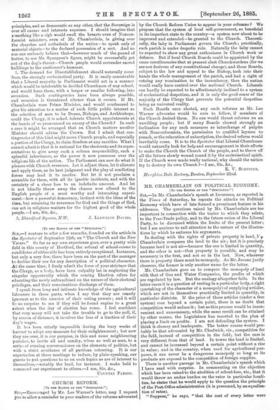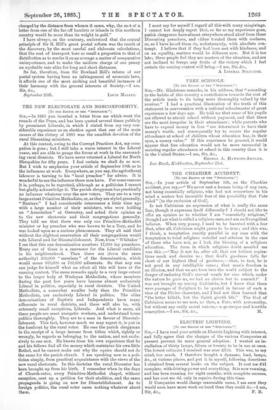MR. CHAMBERLAIN ON POLITICAL ECONOMY.
[To THE EDITOR OF THE "SPECTATOR."] Sta,—In Mr. Chamberlain's speech at Inverness, as reported in the Times of Saturday, he repeats the attacks on Political Economy which have of late formed a prominent feature in his addresses. The questions raised by Mr. Chamberlain are too important in connection with the topics to which they relate, to the Free-Trade policy, and to the future union of the Liberal Party, to be discussed within the limits of the present letter; but I am anxious to call attention to the nature of the illustra- tions by which he enforces his arguments.
In dealing with the rights of private property in land, Chamberlain compares the land to the air ; but it is precisely because land is not air—because the one is limited in quantity, and the other is not—that property is possible, and may be necessary in the first, and not so in the last. Now, wherever there is property there must be monopoly. As Mr. Jevons justly observes, the former is only another name for the latter.
Mr. Chamberlain goes on to compare the monopoly of land with that of Gas and Water Companies, the profits of which are regulated by law. But the analogy altogether fails. In the latter cases it is a question of vesting in a particular body, a right (partaking of the character of a monopoly) of supplying articles, which are not in themselves practically limited in quantity, in particular districts. If the price of those articles (under a free system) rose beyond a certain point, there is no doubt that competition would reduce it ; but as this process would be incon- venient and unnecessary, while the same result can be attained by other means, the Legislature has resorted to the plan of placing a limit on profits. I am not defending the system. I think it clumsy and inadequate. The better course would pro- bably be that advocated by Mr. Chadwick, viz., competition for the field, instead of competition in the field; bat the case is very different from that of land. In towns the land is limited, and cannot be increased beyond a certain point without a rise in value ; and in the country, when used for agricultural pur- poses, it can never be a dangerous monopoly so long as its products are exposed to the competition of foreign supplies. There is another passage in Mr. Chamberlain's speech which I have read with surprise. In commenting on the objection which has been raised to the abolition of school-fees, viz., that it would throw an undue burden on the rates in particular locali- ties, he states that he would apply to the question the principle of the Post-Office administration (it is presumed, by an equalisa- tion of rates).
" Suppose," he says, " that the cost of every letter were
charged by the distance from whence it came, why, the cost of a. letter from one of the far-off hamlets or islands in this northern country would be more than its weight in gold."
I have always, on the contrary, understood that the central principle of Sir It. Hill's great postal reform was the result of the discovery, by the most careful and elaborate calculations, that the cost of transport bore so small a proportion to that of distribution as to render it on an average a matter of comparative unimportance, and to make the uniform charge of one penny an equitable rate alike for long and short distances.
So far, therefore, from Sir Rowland Hill's reform of our postal system having been an infringement of economic laws, it affords one of the most striking and beautiful instances of their harmony with the general interests of Society.—I am, Sir, &c.,



































 Previous page
Previous page